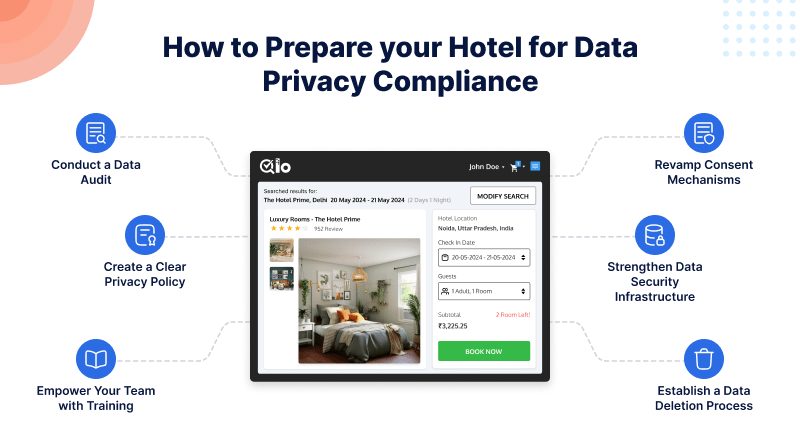As travelers become increasingly aware of their digital rights, hotel data privacy has become a cornerstone of trust in the hospitality industry.
Adhering to global hotel data privacy regulations.
The General Data Protection Regulation (GDPR), the California Consumer Privacy Act (CCPA), and the Personal Data Protection Bill (PDPB), is no longer optional—it’s essential.
How can hotels, tiny and boutique ones, effectively manage complex hotel data privacy laws?
In this blog, we’ll walk you through easy steps your hotel can take to follow the rules, keep guest data safe, build trust, and run your operations more smoothly.
Why Hotel Data Privacy Matters
Running a hotel means dealing with a lot of personal guest information, like IDs, payment details, and preferences.
If this data is misused or leaked, it can lead to big legal problems and hurt your hotel’s reputation.
For example, under GDPR rules, hotels can be fined up to €20 million or 4% of their global income for not following the law.
Even small mistakes—like not getting clear permission or failing to offer a “delete my data” option—can cost you.
Key Global Hotel Data Privacy Regulations Affecting Hotels
- GDPR (Europe): Applies to any hotel that processes the data of EU citizens, even if your property isn’t based in Europe.
- CCPA (California): Requires transparency in how data is collected, shared, and sold for guests from California.
- PIPEDA (Canada): Focuses on meaningful consent and security safeguards.
- PDPB (India): India’s upcoming legislation emphasizes data localization and transparency.
- APPI (Japan) and other region-specific laws continue to expand the global privacy landscape.
Hotels must prepare now for a future where data rights are non-negotiable.
How to Prepare Your Hotel for Compliance
1. Conduct a Data Audit
Start by mapping out:
- What data do you collect (guest names, emails, preferences, passport copies, etc)
- Where it’s stored (PMS, channel manager, third-party tools)
- Who has access to it (front desk, marketing, housekeeping, etc)
Identify unnecessary data collection points. Do you need a guest’s phone number or passport copy for local bookings? If not, eliminate it.
Learn how to collect hotel guest data effectively to refine your data strategy and improve guest trust.
2. Revamp Consent Mechanisms
Consent must be explicit and informed.
- Use opt-in checkboxes for email marketing.
- Clearly state why data is being collected and how it will be used.
- For minors, implement age verification to obtain guardian consent.
Your booking forms, website pop-ups, and even offline check-in forms should reflect these standards.
3. Create a Clear Privacy Policy
A well-drafted privacy policy is your best legal defense. It should include:
- What guest data do you collect
- Why and how it’s collected
- Who you share it with (e.g., OTAs, payment gateways)
- How guests can access, rectify, or delete their data

Make this policy easily accessible on your website and booking confirmation emails.
4. Strengthen Data Security Infrastructure
Compliance is not just about paperwork—it’s about protecting actual systems.
- Ensure your PMS and channel manager are SSL-encrypted.
- Regularly update software to patch vulnerabilities.
- Use secure access controls—only authorized personnel should access sensitive guest data.
- Back up data and implement disaster recovery protocols.
Strengthening data security can avoid Data breaches in Hotels. If you’re using an open-source hotel software like QloApps, make sure your hosting partner also follows secure data practices.
5. Empower Your Team with Training
Your staff are the first line of defense. Staff Training and Development play an important role in hotel data privacy.
- Recognizing phishing attempts
- Safely handling guest documents.
- Respecting guest privacy during check-in or on calls
Every new hire should undergo a basic hotel data privacy orientation.
6. Establish a Data Deletion Process
Under most laws, guests have the right to be forgotten. This means:
- You must delete their data upon request
- And confirm its deletion if asked.
Set a standard protocol with your IT team or software provider to make this process swift and documented.
Beyond Compliance: Building Guest Trust
Guests are more likely to book directly with a hotel that they trust.
If your property is GDPR- or CCPA-compliant, showcase it on your website. Consider a “Your Data, Your Rights” section where guests can easily:
- Request access to their data
- Delete their profile
- Unsubscribe from marketing
This transparency boosts direct bookings and builds long-term loyalty.
Final Thoughts
Data privacy isn’t just about avoiding fines. It’s about building trust by showing guests that their personal information is safe with you.
As data laws become stricter, hotels that focus on privacy will have an advantage.
Whether you run a small hotel or a large chain, making small changes now can help you avoid bigger problems later.
Using tools those built with global privacy rules in mind can help you stay on track and gain guest confidence.
Get in touch
If you’re ready to elevate your hotel’s operations or have any questions, QloApps is here to assist!
Let’s collaborate to streamline your processes and enhance guest satisfaction.
Discover how QloApps’ Property Management System and Channel Manager solutions can simplify your operations and boost your revenue.
Get in touch now, and future-proof your business for the future of hospitality.

Be the first to comment.